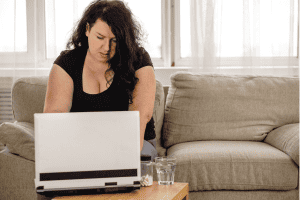Experiencing Health Anxiety Post Birth
Health anxiety can interfere with life, but it is treatable.
Are you ruminating over your health or the health of your baby, partner, or other loved ones? Maybe you’re actively trying to avoid thinking about it altogether, but thoughts and questions still creep in at night? You find yourself Googling health information, or worried that that sniffly nose, or warm forehead is life threatening.
If this sounds like you or a loved one, this might be health anxiety.
What is health anxiety?
To worry about our health sometimes is natural and part of being human. Health anxiety describes a persistent and intense worry about your health, or the health of those you care about, that starts to interfere with your life and your wellbeing.
Anxiety comes about at times when we think something bad might or will happen.
The birth of a child can be a time when we’re more susceptible to developing anxiety around things like health.
While we often hear of the outwardly physical signs of anxiety – breathing difficulties, racing heart, sweaty palms – but internally, anxiety can show up as – being focused on worst case scenarios, people pleasing with those around us, experiencing racing thoughts and overthinking situations, being self critical, and difficulty in setting boundaries.
Health anxiety can impact us in a range of ways, including:
Compulsive Checking: Constantly monitoring the baby’s temperature, weight, and milestones or frequently checking your own health metrics can be a sign of health anxiety. The need for reassurance may lead to repeated visits to healthcare providers.
Avoidance of Certain Situations: Fearful thoughts about potential health risks may lead to avoidance of specific situations or activities. This can limit the range of experiences and joy that new parents might otherwise engage in. It can also impact close relationships with friends and family.
Impact on Daily Functioning: Health anxiety can infiltrate daily life, affecting your ability to concentrate, make decisions, or complete routine tasks. This can result in heightened stress and a feeling of being overwhelmed.
Interference in Parenting Style: A hyper-focus on health can influence parenting decisions, making some individuals excessively cautious or overprotective. Striking a balance between care and allowing natural childhood experiences can become challenging.
Sleep Disturbances: Constant worry about health, especially during the night, can lead to sleep disturbances. Difficulty falling asleep or staying asleep is common among individuals grappling with health anxiety.
Impact on Personal Identity: Health anxiety can influence one’s perception of themselves as parents. The constant worry might overshadow the joy of parenthood, impacting the development of a positive parental identity.
Strained Partner Relationships: The stress and preoccupation with health concerns can create strain in intimate relationships. Partners may struggle to understand or cope with the continuous worry, leading to increased tension.
Influence on Decision-Making: Health anxiety can influence various decisions, from healthcare choices to lifestyle decisions. Individuals may opt for unnecessary medical interventions or make choices based on fear rather than informed decision-making.
3 ways health anxiety can show up, post-birth
Post-birth, health anxiety can show up in a number of ways, from heightened concerns about the baby’s health, to an amplified awareness of your own wellbeing.
- Hyper-awareness: New mothers can find themselves hyper-focused on every nuance of their baby’s health, interpreting minor changes as potential signs of illness. This hyper-awareness can extend to their own wellbeing, creating a cycle of vigilant monitoring.
- Self-diagnosis: The accessibility of medical information online can lead us to turn to “Dr Google” for information and a better sense of control over the health of baby/self. New parents can find themselves immersed in researching symptoms, and self-diagnosing, which can increase health anxiety.
- Fear of the unknown: The unpredictable nature of a newborn’s health and the learning curve of parenthood can trigger fear and uncertainty, amplifying health anxiety for postpartum mums.
Ruminating over these health worries is absolutely natural. But it’s not always helpful.
Seeking support for perinatal health anxiety
Acknowledging health anxiety may be playing a part in your life is such an important first step in finding a way through this experience. Please know that health anxiety is treatable and support is available.
Here are some avenues for support:
Talking to trusted people in your life: Sharing your concerns with trusted friends, family, or with your partner can alleviate some of the intensity and open pathways for understanding and support.
Professional support: Speaking with a specialist perinatal counsellor can be a safe space to process your thoughts, feelings and experiences. They can offer strategies and tools to support you to navigate and treat health anxiety.
If you’re interested in counselling, you can learn more about individual perinatal and trauma counselling here. I would love to support you to process your experience of health anxiety.
Fiona x















